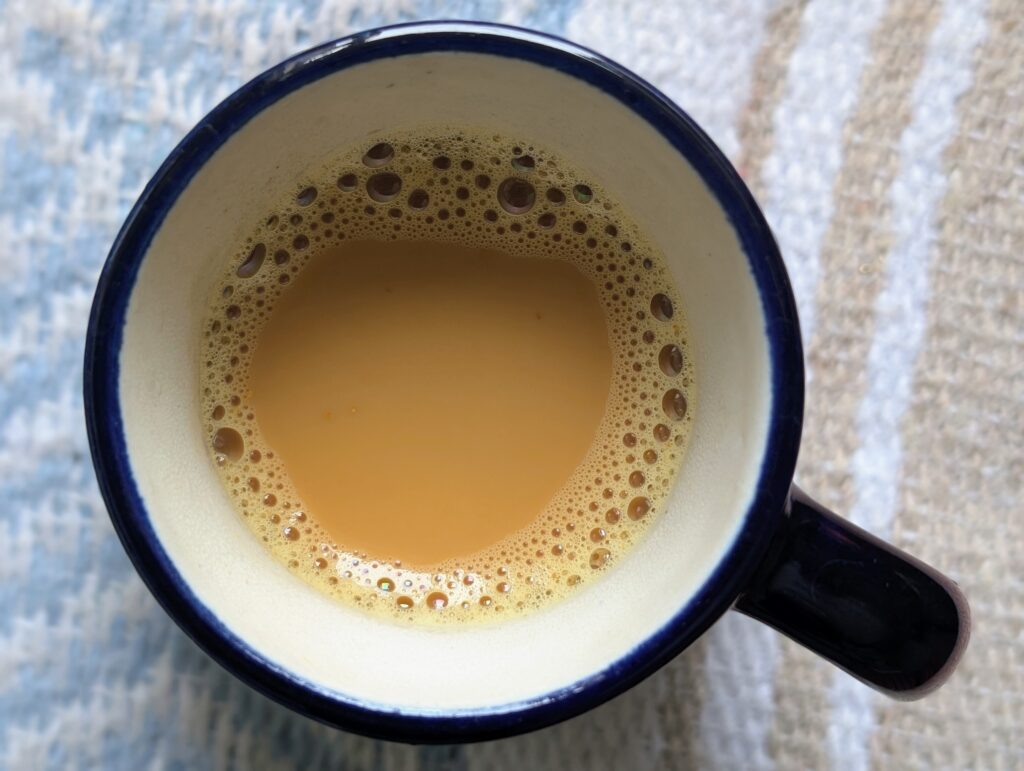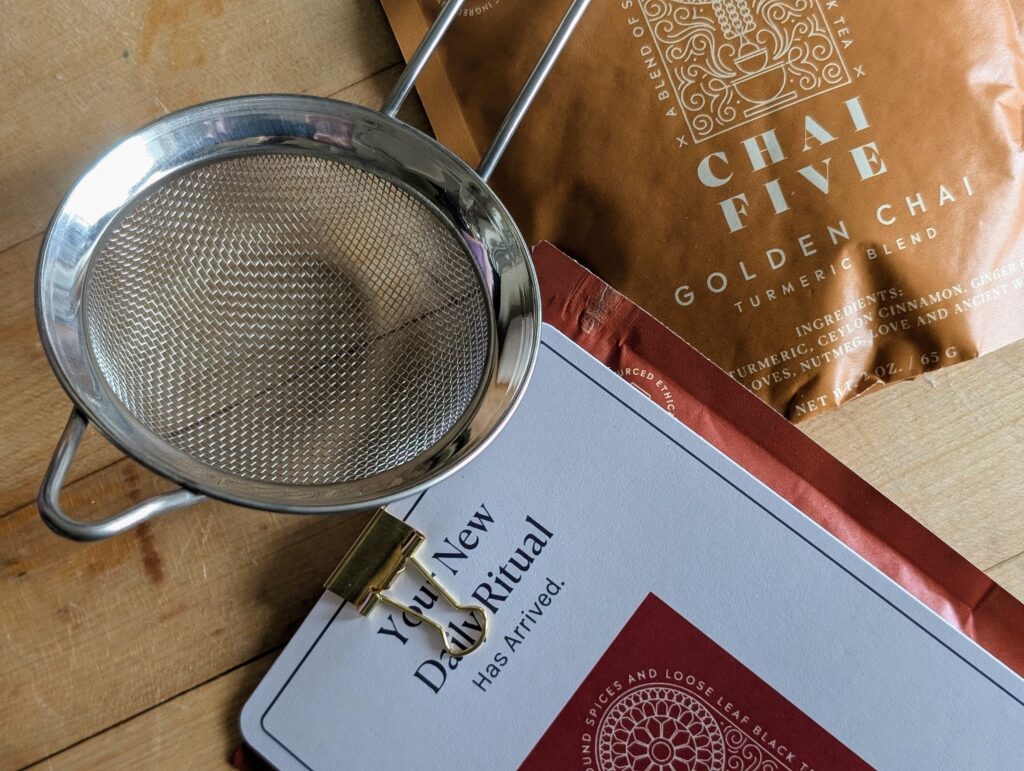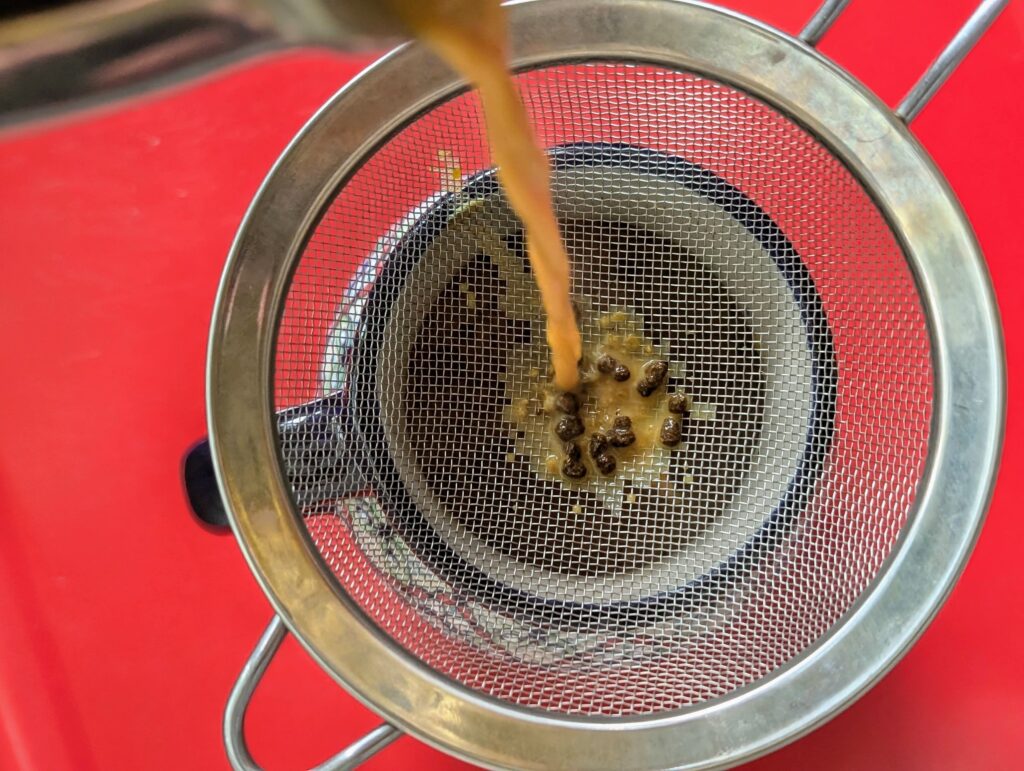June 27, 2025—The details that flow from a batch of Chai Five Organics prove homespun and worldly, heavenly and devilish, personal and profound, subtle and intense.
Also delicious, no honey needed.
Here appear five crucial details among them.

Detail #1: Naniba and Dada.
Santa Cruz entrepreneur Ani Joshi’s startup ultimately connects with places like Zanzibar and Mozambique, but it starts at home.
Joshi grew up living with her grandparents (aka Niniba and Dada) in Colorado.
It took a health scare to reconnect her with the handmade tea made by the lifelong farmers and foragers that were her elders.
In addition to rice, sorghum and cotton, Joshi’s grandparents also grew spices for family consumption, including cumin, tulsi and shankhpushpi.
But as much as anything, they brewed a cozy sort of identity.
“Their chai is ingrained in my memory from childhood…It was always uplifting, nourishing and restorative—the taste, the aroma,” Joshi says. “Everything about it was low-key magical.”

Detail #2: Personal health breakdown.
Ani Joshi was coughing. And coughing and coughing and…
Her immune deficiencies meant a common cold would get uncommonly uncomfortable—to the point she dropped out of graduate classes because nobody wants to be hacking and wheezing nonstop while a professor delivers a lecture.
“Constantly,” she says. “Like having bronchitis for weeks and weeks.”
That fed a ruthless loop.
“I would be dis-regulated, which creates more stress, more tiredness, then I adjust with with more coffee, then experience more adrenal fatigue, and then more stress and fatigue,” she says.
So she started looking at alternative therapies, which led to a change in daily habits, including breath work and yoga, and her family recipe for chai and its affirming elements like ginger and cardamom.
“Chai, in addition to reminding me of home, presents a ritual that brings me balance,” Joshi says. “It’s a ritual to revitalize, to reset my nervous system. It’s a ritual to bring my vitality back.”

Detail #3: The liquid spirituality.
A wellness practice that’s gotten trendy in California in recent decades enjoys ancient roots: Ayurveda has uplifted humans for centuries in large part because it transcends plant medicine designed for various personal energies, or doshas, with a wider approach to living.
In other words, Ayruvredic healing is about a lot more than herbal remedies. It centers around overall well-being, across peace of mind, diet, meditation, massage and detoxification.
With her chai business, Joshi applies a similar holistic approach.
She seeks out farmers in India, Sri Lanka and Zanzibar, fair-trade style, then works with a Watsonville milling operation to stone grind her ingredients without applying heat that breaks down phytonutrients.
“When I tell friends, family and customers how Chai Five is the first 100% single-origin, ethically- and sustainably-crafted heirloom chai, the general response is, ‘It’s about time,’” she says. ““There has been little to no innovation in the tea [and] chai industry in the past 300 years—there’s only been degradation, colonization, and exploitation—so I’m building the chai company I wish existed, one that respects tradition, farmers, our health and our environment.”
For the hardcore Aryuvedic homies out there, her tea mixes are designed to stoke all doshas. She calls Chai Five a “tri-doshic blend.”
“My teas are appropriate for any dosha—every proportion of spice isn’t coincidence,” she says. “They’re created to balance the elements of the body, with ingredients that work together, like nutmeg and cardamom to sooth the gut, and cloves that help calm the nervous system.
“You get the benefit of each ingredient without overstimulation from any one of them.”

Detail #4: The Middlebury magic.
I encountered Chai Five on assignment, through Middlebury Institute.
I help the downtown Monterey graduate school, formerly known as Monterey Institute for International Studies, or MIIS, by writing stories that honor its role as a launchpad for environmental policy and nuclear nonproliferation minds, among other super-empowerment angles.
(It was Middlebury reporting, in fact, that helped turn me onto ways creative problem solvers are leveraging sea urchin crises to support Michelin-starred seafood dishes—and how local sea otters can be the cutest economic engines ever.)
Joshi’s autoimmune struggles almost forced her to drop out at Middlebury, but she endured, and credits the school with giving her the foundation to develop her business, which began as a humble stall at Old Monterey’s Farmers Market.
“I wouldn’t have had the global perspective or encouragement without Middlebury,” said Joshi, whose role placing students in the Ambassador Corps Program helped her get selected as a Fulbright Scholar conducting research on agroforestry in the Brazilian Amazon.
“That fundamentally shaped my understanding of regenerative agriculture and traditional knowledge systems,” she says.
She then landed a Boren Fellowship in Mozambique, journeying up the Indian Ocean coast to Zanzibar, where she connected with spice farmers practicing centuries-old techniques.
“Without my public policy career and my international experiences facilitated by the Middlebury Institute, I wouldn’t have had the vision to create a global impact,” she says, “or the knowledge to navigate building the global, ethical supply chains that make Chai Five unique.”

Detail #5: Tumeric.
All the thoughtful—and personal—plot twists that contribute to the Chai Five story don’t mean a whole lot if the tea isn’t tasty.
Against a landscape of chai depravity that true tea-heads I consulted call “a wealth of compost tea” and “afterthoughts” that conjure comparisons to portobello mushroom sandwiches offered as a meek vegetarian option at restaurants, this brew bursts from the cup.
The notes I scribbled while sipping include “depth,” “strong AF” and “that = TUMERIC.”
Monterey resident and time-tested Chai Five fan Emily Gottlieb gets it. She switched from being a self-described “coffee drinker for life” until she found a regular regimen prepping a cup on the stove every morning.
“It takes about 5 minutes and while it’s brewing it fills the kitchen with its complex spicy sweet smell that is just so comforting,” Gottlieb says. “The ginger and cardamom flavors really stands out, more than any other chai I’ve tried.”
Joshi ranks among many who feel like quality chai represents a forgotten art.
“Premium coffee shops go so far to carry really good single origin coffees,” she says. “It’s time to bring chai back to its origins and elevate it to its original intention—and also bring back the nourishing elements, and its function as an elixir of life.”
Joshi hosts a free chai tasting at Staff of Life at 1266 Soquel Ave., Santa Cruz, 4-6pm Saturday, July 11. More at Chai Five’s website.
About the author
Mark C. Anderson, Edible Monterey Bay's managing editor, appears on "Friday Found Treasures" via KRML 94.7 every week, a little after 12pm noon. Reach him via mark@ediblemontereybay.com.
- Mark C. Andersonhttps://www.ediblemontereybay.com/author/markcanderson/
- Mark C. Andersonhttps://www.ediblemontereybay.com/author/markcanderson/
- Mark C. Andersonhttps://www.ediblemontereybay.com/author/markcanderson/
- Mark C. Andersonhttps://www.ediblemontereybay.com/author/markcanderson/



